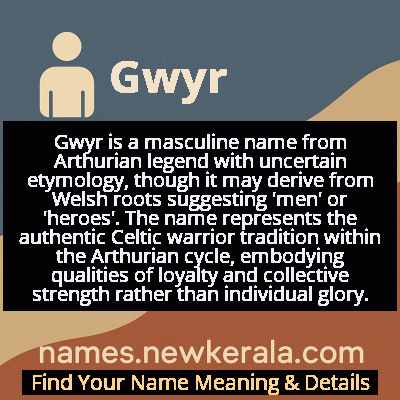Gwyr Name Meaning & Details
Origin, Popularity, Numerology Analysis & Name Meaning of Gwyr
Discover the origin, meaning, and cultural significance of the name GWYR. Delve into its historical roots and explore the lasting impact it has had on communities and traditions.
Name
Gwyr
Gender
Male
Origin
Arthurian
Lucky Number
1
Meaning of the Name - Gwyr
Gwyr is a masculine name from Arthurian legend with uncertain etymology, though it may derive from Welsh roots suggesting 'men' or 'heroes'. The name represents the authentic Celtic warrior tradition within the Arthurian cycle, embodying qualities of loyalty and collective strength rather than individual glory.
Gwyr - Complete Numerology Analysis
Your Numerology Number
Based on Pythagorean Numerology System
Ruling Planet
Sun
Positive Nature
Leaders, ambitious, highly driven, self-reliant, innovative.
Negative Traits
Overly aggressive, domineering, impatient, selfish.
Lucky Colours
Red, orange, gold.
Lucky Days
Sunday.
Lucky Stones
Ruby, garnet.
Harmony Numbers
2, 3, 9.
Best Suited Professions
Entrepreneurs, managers, engineers.
What People Like About You
Courage, determination, leadership.
Famous People Named Gwyr
Gwyr
Arthurian Knight
Faithful knight in King Arthur's service mentioned in Welsh Arthurian traditions
Gwyr of Caerleon
Welsh Warrior
Legendary figure associated with Arthur's court at Caerleon in Welsh folklore
Gwyr ap Gwyddno
Nobleman
Minor noble in Welsh genealogical records with Arthurian connections
Name Variations & International Equivalents
Click on blue names to explore their detailed meanings. Gray names with will be available soon.
Cultural & Historical Significance
Extended Personality Analysis
The name Gwyr evokes personality traits strongly associated with Celtic warrior ideals and Arthurian chivalry. Individuals bearing this name are typically perceived as possessing steadfast loyalty, quiet strength, and a deep sense of duty to their community or cause. They tend to be practical rather than flamboyant, preferring substance over showmanship and demonstrating their worth through consistent action rather than boastful words. The Gwyr personality combines resilience with humility, embodying the Celtic concept of the warrior who serves rather than dominates. These individuals often exhibit strong protective instincts toward those in their care and value tradition and heritage while remaining adaptable to changing circumstances. Their strength lies in their reliability and the depth of their commitments rather than in dramatic displays of prowess. The name suggests someone who is grounded, emotionally stable, and capable of enduring hardship without losing their core values or sense of purpose. This personality profile reflects the historical context of early medieval warriors who needed both physical courage and emotional fortitude to survive in a turbulent era.
Modern Usage & Popularity
In contemporary naming practices, Gwyr remains an extraordinarily rare choice, primarily confined to Welsh-speaking families, Arthurian enthusiasts, and those with strong connections to Celtic heritage. The name has never registered on official popularity charts in any English-speaking country and maintains a status as what might be termed an 'archaeological' name—one revived from historical texts rather than passed down through living family traditions. Its usage is almost exclusively masculine and often appears in contexts where parents are deliberately seeking names with authentic Arthurian or Welsh roots rather than following current naming trends. The name's obscurity makes it appealing to those wanting a distinctive name with historical depth, though its unfamiliar sound and spelling outside Wales often lead to practical challenges in daily use. Some modern bearers may use Anglicized versions or nicknames in professional contexts while preserving the full traditional form for personal and family use. The name's continued, though minimal, usage represents a small but meaningful effort to keep Brythonic linguistic heritage alive in the modern era.
Symbolic & Spiritual Meanings
Symbolically, Gwyr represents the enduring power of collective identity and cultural memory. As a name that may mean 'men' in its plural form, it metaphorically signifies the idea that individual identity is inextricably linked to community and shared heritage. The name carries connotations of ancient oaths and bonds of loyalty that transcend individual lifespan, connecting present to past through the continuity of tradition. In a broader sense, Gwyr symbolizes the resilience of Celtic culture despite centuries of political and linguistic pressure, serving as a living artifact of Brythonic heritage. The name also represents the earthier, more grounded aspects of the Arthurian tradition—the practical warriors rather than the romanticized knights—reminding us that the legends grew from real historical contexts and cultural values. Metaphorically, bearing this name suggests carrying forward ancient wisdom and strength into modern times, acting as a bridge between historical legacy and contemporary identity.

